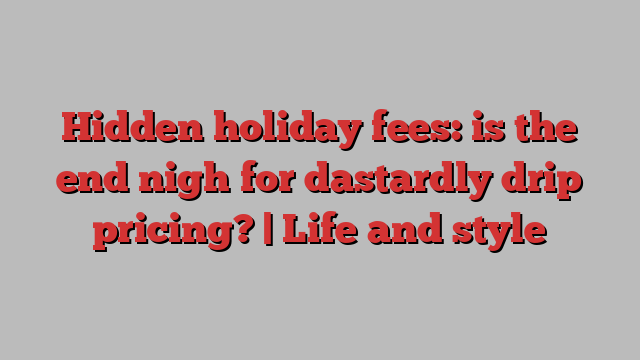
Name: Drip pricing.
Age: The term has been around since the 1970s, but airline liberalisation in the 1990s turbo-charged the practice.
Appearance: Well-hidden.
Hello! It’s a beautiful day. I suppose. You’re unusually perky; what’s up?
I’m in the middle of booking a bargain holiday. Tell me more.
Well, I’ve found a flight to Bergamo for less than £12 and a £46-a-night self-catering spot. That’s a holiday for pennies! I’m spending the rest on pasta, gelato and wine. Result. Right. Are you taking a bag?
Obviously. I’m planning on bringing back a whole ham. Maybe a few litres of local red. OK, so you’ll need hold luggage. And do you want to sit with your partner?
Of course. Both ways?
Eh? Why? Because all that will cost you another, ooh, 30 or 40 quid a head, I reckon.
Damn, you’re right. I’ve clicked a few buttons and already it’s at more than £70 a head. I haven’t even reached the checkout yet. Sorry. Maybe you should also check the cleaning and “service” fees and taxes on your accommodation.
Hang on, let’s see … What? £44! That’s 15 balls of delicious gelato! How did you not know about this? You must remember the poor elderly couple who were charged £110 by Ryanair for downloading the wrong boarding passes this summer?
I must have missed that story. Well, hidden costs are rife in the travel sector. It’s called “drip pricing” – the government announced in June that it’s investigating the practice and yesterday revealed that it will now consult on what can be done about it.
Does that refer to the drip of my tears as I mourn my holiday? Poetic. It’s actually the drip of extra costs that mean the headline price you first see bears little relation to what you will actually pay.
It’s so sneaky! A recent report by the business department into online drip pricing singled out travel, food delivery and entertainment as problematic. It found mandatory “dripped” costs added 6% to the total cost and optional ones 14%. The consumer group Which? has called the practice “underhand”.
I’m ashamed I fell for it. Don’t beat yourself up: drip pricing ruthlessly exploits consumer psychology. There’s “anchoring”: we get attached to the information we consider most important (the base price), which stops us from working out if what we ultimately pay offers value for money. Then “loss aversion” means that once we’ve started the tedious process of trying to book based on the alluring initial price, we don’t want to give up and start again.
So instead of a cheap holiday, I’m getting an economics lecture. Great. Who needs pasta and vino when you can read a 62-page government report on drip pricing for free?
Do say: “Fly with us to beautiful Rome, Barcelona or Naples for the price of a cup of coffee.”
Don’t say: “If you want breathable air in the cabin, that’s extra.”